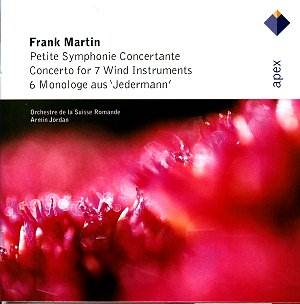Fans of this superb composer will, like me, want to
jump for joy at this release. Here we have, at super budget price, three
of Martinís greatest works in first-rate performances and modern, full-bodied
digital sound. The recordings were completely new to me and, like many
re-releases on the excellent Apex label, plug an important gap in this
repertoire. Many Martin enthusiasts will undoubtedly have in their collections
the estimable Ansermet recordings from the 50s, latterly on a mid-price
Decca Double and certainly worth having as a cross-section of the composerís
work. However, some are in mono and generally they do sound their age
a little. There is what I hope is an ongoing Martin series from Mathias
Bamert on Chandos, though he opts for the orchestral version of the
Petite Symphonie, well worth hearing but no way as ear-ticklingly
provocative as the original. So this release has the budget field to
itself, and itís good to be able to report that the performances really
do the pieces justice.
Problems of internal balance tend to plague recordings
of the Petite Symphonie. Martinís tricky combination of soloists
within a purely string texture seem to fox the engineers (and sometimes
the conductor). One of the most impressive things about this disc is
the feeling that no one is falsely highlighted (particularly the harpsichord),
thus disfiguring the aural landscape. Armin Jordan is an immensely experienced
conductor, and his recording team have done him proud in letting the
concertante instruments emerge naturally from the orchestra,
being Ďfeaturedí but not jumping ridiculously from the speakers. He
also paces the score superbly. The dark opening is full of brooding
atmosphere, and when the allegro con moto finally bursts in and
we hear the soloists, Martinís highly resourceful deployment of this
unique combination is suitably startling. Jordan shapes the angular
melodic lines, which flirt with serialism, with a real sense of their
delicacy as well as their harmonic ingenuity. The beautifully crafted
slow movement is atmospheric without lingering, and the vivacious alla
marcia finale as buoyant as any baroque concerto grosso by Handel
or Corelli.
The ĎJedermanní Monologues is, for me, one of
Martinís greatest works and well worthy to stand as one of the finest
song cycles of the 20th Century. The cycle was cleverly extracted
from Hofmannsthalís play ĎJedermanní (Everyman),
itself based on the medieval morality play. The central theme is, broadly
speaking, the destructive power of excessive wealth, something that
would have fired an artist of Martinís sensibilities. No knowledge of
the original play is necessary, and in many ways the mystery and power
of these contextless but connected monologues is heightened by experiencing
them Ďcoldí. Fischer-Dieskau, who thought highly enough of them to make
two recordings, spoke of "an overriding sense of an unnamed horror
being faced by a lone, morally lost figure". The scoring, which
heightens the mood of foreboding, has a Mahlerian fin-de-siècle
feel to it, and Martin uses his characteristically keen ear for sonority
to make the most out of relatively modest forces. The final song O
ewiger Gott, where the soloists pleads for salvation, is as powerful
as anything in Mahler or Britten. It must be said that this cycle has
been well served in the catalogue, most recently by David Wilson-Johnson
on Chandos, but Gilles Cachemaille is unlikely to disappoint. His full
bodied, dramatic baritone realises every nuance in the settings, and
he is beautifully partnered by Jordan and the Suisse Romande, who of
course have an enviable history and track record in Martinís music.
The Wind Concerto, another beautifully crafted
and quirky piece, is also well served on other labels, but again this
is as good as Iíve heard, and a lot cheaper. The intriguing scoring
instantly gives the piece character, and here Martin flirts with a mixture
of atonality and popular style, sometimes spicily astringent but always
appealing. There are hints (jibes?) at Ravelís La Valse in the
first movement, and more than a passing reference to Haydnís Clock
Symphony in the steady tread of the slow movement. All this is hugely
enjoyable without ever being banal, and only serves to illustrate Martin's
particularly inventive brand of neo-classicism. The featured wind players
here are all excellent, and Jordan makes the most of the many contrapuntal
dialogues without ever losing the bigger picture.
Martin enthusiasts will want to snap this up anyway,
but lovers of central European music in the war-torn years of the last
century should also find much to stimulate and enjoy. Booklet details
are just about adequate, though full marks again to Apex for providing
the invaluable texts and translations. Very highly recommended.
Tony Haywood


